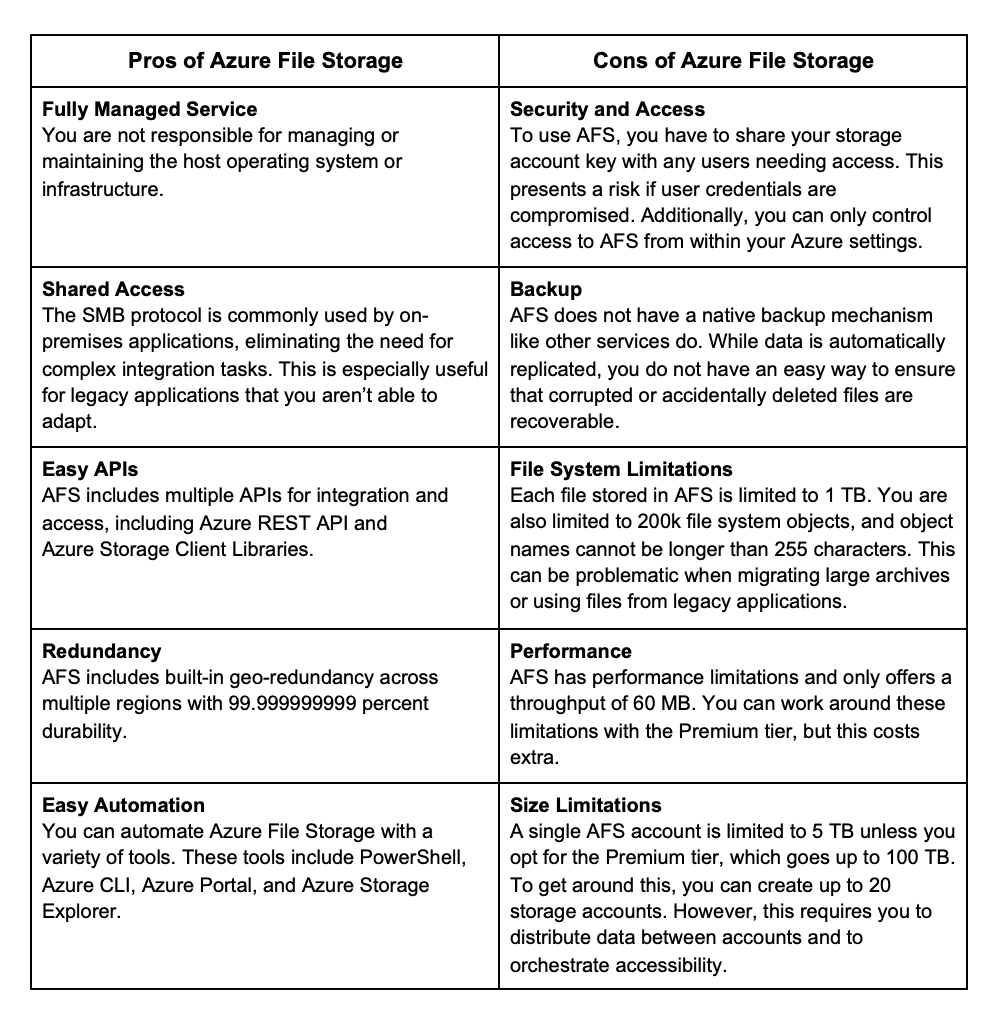
Click here to learn more about Gilad David Maayan.
Microsoft Azure is ranked amongst the top cloud computing vendors, competing for market share with Amazon Web Services (AWS) and Google Cloud Platform (GCP). Azure is known for its enterprise-level cloud services, many of which provide features for easy integration, implementation, and management of hybrid architectures. In this article, you’ll learn about a service called Azure File Storage (AFS), which enables easy SMB file sharing.
What is Azure File Storage (AFS)?
AFS is a storage service in Azure that you can use for Server Message Block (SMB) file shares.
You can use it to enable applications running on cloud-hosted virtual machines to share files via standard protocols such as ReadFile or WriteFile.
Features of AFS include:

- Management: easy management from your storage account console
- Security: built-in in-transit encryption via HTTPS and the Server Message Block (SBM) protocol
- Support: can easily integrate with a variety of tools, APIs, and libraries
- Scalability: can scale resources up to 100 TB
- Access: data accessible from anywhere via SMB or REST
Use Cases for Azure Files
There are many use cases for Azure File Storage. The most effective cases include:
- File Server: used in place of on-premises or Network Attached Storage (NAS). When AFS is combined with File Sync (a service covered below), it enables you to cache data in a distributed way and increase system performance.
- Lift and Shift: enables you to migrate on-premises file shares as-is to Azure. This reduces the need to refactor or alter legacy applications and data while enabling you to gain cloud service benefits.
- Application Share: enables you to migrate configuration files and application data to be used by on-premises or Azure-hosted applications. For this use case, however, you can only use the SMB protocol.
- Monitoring and Analytics: enables you to centralize logging and metrics data for use with monitoring and analytics tools. This is especially useful when you need to analyze on-premises system failures or crashes since data is protected in the cloud.
- Development and Testing: used as a central repository of codebases, tools, and utilities needed for software development and testing. Remote, synced access facilitates agile workflows.
Azure File Storage Pros and Cons
Azure File Storage is a fairly straightforward service with a small learning curve. Most users are already familiar with how traditional file systems work and can easily transition to a similar file system in the cloud. However, there are several other pros and cons you should be aware of when using AFS.

What is Azure File Sync?
An additional service you can use to increase the benefits of AFS is Azure File Sync. Azure File Sync is a service that enables you to transparently extend Azure File Storage functionality. This is accomplished by installing File Sync on an on-premises Windows server and creating a local file cache that syncs with the cloud. It enables you to transition data to the cloud and maintain synchronization without additional replication services.
File Sync enables you to locally access files via SMB, Network File System (NFS), or File Transfer Protocol Secure (FTPS). It includes features for New Technology File System (NTFS) compression and Access Control Lists (ACLs) and supports the use of sparse files. Sparse files are a type of file that uses metadata to represent empty data blocks, reducing file sizes.
Azure File Sync is designed to reduce issues caused by server sprawl and to ensure that data is not lost in the event of hardware failure. You can use it to tier Azure File Storage and on-premises resources, minimizing storage requirements without reducing accessibility.
Conclusion
Azure File Storage is a useful service for file sharing. You can use AFS as a file server, for lift and shift migration, for application sharing, monitoring and analytics, and development and testing. AFS is a fully managed service, providing easy automation and API integration.
However, AFS has limitations that might interrupt enterprise-level operations, such as the storage limit of 1 TB per file. Backup is also limited to manual configuration, and there’s no native solution. This is why Azure partnered with NetApp to solve some of these limitations, providing security and high performance through a native, third-party integration called Azure NetApp Files.
